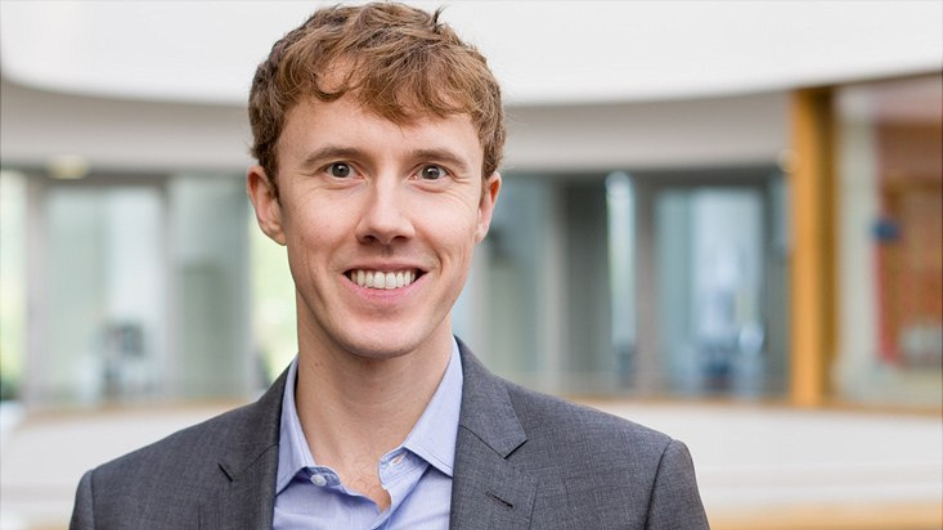Femtosecond Science on a Chip
Assistant Professor of Physics James McIver is speeding up quantum research with ultrafast lasers.

The science of quantum materials centers on the tiny world of atoms arranged into crystals. At ultrasmall, nanoscopic scales, electrons interact with each other and their surroundings incredibly fast, and remarkable quantum effects like superconductivity can emerge. While quantum materials are complex subjects, this complexity brings infinitely many surprises and offers plenty of opportunities for creativity and imagination.
“I like to call it garage physics,” said James McIver, of his work on quantum materials. He compared that work to his time spent tinkering on motorcycles as a kid. “A quantum materials lab is like a fancy garage where you have all the tools you need to test your most imaginative scientific ideas in a very hands-on way. It’s as much a hobby as a job,” he mused. After spending seven years working at the Max Planck Institute for the Structure and Dynamics of Matter (MPSD) in Hamburg, Germany, McIver returned to the United States in 2022 to become an assistant professor of physics at Columbia. He brought his hands-on approach to quantum science with him, along with some incredibly fast lasers.
After completing his PhD at Harvard, McIver joined the MPSD as a postdoc in 2015. He became a group leader at MPSD in 2020 and assistant professor at Columbia in 2022 through the Max Planck-NYC Center for Nonequilibrium Quantum Phenomena, a collaboration established in 2019 by the Max Planck Society, the Flatiron Institute, and Columbia to link quantum research between the institutions. “Cross-Atlantic collaborations like the ones enabled by the Center are intellectually appealing for many reasons. Yet it takes an exceptional kind of physicist to transform abstract benefits into concrete collaborative projects. James McIver is one such physicist,” said Dmitri Basov, a co-lead at the Center and chair of Columbia’s Physics Department.
"A quantum materials lab is like a fancy garage where you have all the tools you need to test your most imaginative scientific ideas in a very hands-on way. It’s as much a hobby as a job."
Researchers at the Center explore what happens when quantum materials, a class of solids where the principles of quantum mechanics reign, are pushed out of their stable, baseline states. Doing so can produce quantum phenomena like superconductivity, ferromagnetism, and the quantum Hall effect, depending on one’s “tuning knob” of choice. Some scientists use temperature and pressure to manipulate materials; others, electric or magnetic fields. McIver uses ultrafast pulses of laser light.
During his PhD, he first explored how light can induce electronic motion in materials in the form of electrical currents. As a postdoc, he began using ultrafast laser pulses to reshape the quantum world itself that determines how electrons move. Working with graphene—an atomically thin layer of carbon atoms—he used pulsed laser light to engineer new pathways of electrical current flow in graphene that could potentially be immune to energy loss. But electrons move fast; to keep up with them, McIver expanded upon methods to interface microscopic quantum materials to specialized ultrafast circuitry. The resulting chip-scale devices can detect electrical currents flowing in quantum materials on femtosecond-time scales—that’s one quadrillionth of a second.
Engineered onto a chip, that kind of speed could one day contribute to faster computer transistors, while light as a means to manipulate the flow of electricity might yield more energy-efficient electrical devices. For his research on ultrafast electronic transport, McIver recently received an Early Career Award from the Department of Energy, which will help him continue to explore the fundamentals of how light can produce unique electronic effects in different kinds of quantum materials. “I’m honored to receive this award, which was facilitated by the support of the Max Planck–NYC Center,” said McIver.
McIver’s new lab at Columbia is nestled between those of fellow quantum scientists Dmitri Basov and Cory Dean in the Northwest Corner Building on the Morningside Campus, and he maintains close ties with group members and colleagues still in Hamburg. For example, his students working in New York routinely send devices to Germany for testing using the collaborative facilities developed through the Max Planck-NYC Center.
Managing an international research operation across two continents means a lot of early mornings and late nights on Zoom, and it underscores the importance of fostering an open, collaborative group culture to keep the science moving. “We use a mentorship chain. You learn the most from scientists a few years older than you, while that spirit of teaching those younger reinforces your own knowledge and understanding,” McIver said. “I look to senior scientists in the field and understand the importance of asking for advice early and often.”
Science at high speeds is rewarding but requires long hours and tremendous dedication to see complex projects through. Nevertheless, McIver notes how important breaks are for producing your best ideas. His hobby outside of the lab is music. A classical and jazz pianist growing up, he picked up the banjo in college and dabbled in making electronic music while in Germany. New York is a new scene that’s sure to inspire new physics.
